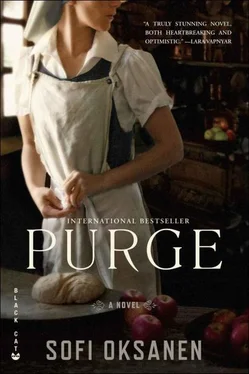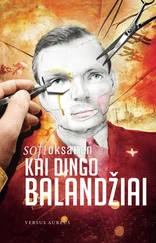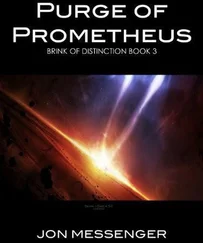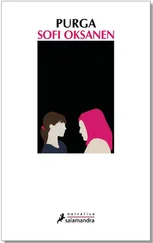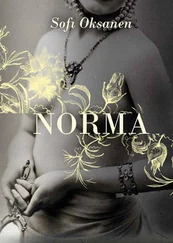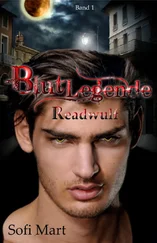Talvi called from Finland the next day.
“Mom, stay in the house.”
“What? Why? What’s happened?”
“Do you have any iodine?”
“No.”
“A nuclear reactor exploded in Ukraine.”
“No, it didn’t.”
“Yes, it did. There are high radiation readings in Finland and Sweden. Chernobyl. Of course they haven’t told you anything about it there.”
“No.”
“Keep Dad inside and get some iodine. Don’t tell him
about it. He wouldn’t believe you, anyway. Don’t eat any berries or mushrooms. And don’t pick any.”
“There aren’t any yet.”
“I mean it, Mom. Don’t pick them in the fall, then. Stay inside for a couple of days. The worst fallout will be over by then. They’re not letting people take their cows out in Finland-so they won’t eat contaminated grass. They might not be able to go out for the rest of the summer. We’ve closed the damper on the stove, too.”
The call was cut off.
Aliide put down the receiver. Talvi had sounded shaken, which wasn’t like her. Her voice was usually flat. It had turned flat after she moved to Finland to live with her husband. And she didn’t call very often. She called very rarely, which was understandable, since you had to make a reservation to call, and you couldn’t always get one, and if you did you had to wait for hours at a time to get a decent connection. Besides, it was sickening knowing that they listened in on the calls.
Martin called from the living room, “Who was it?”
“Talvi.”
“What was she calling about?”
“Nothing much. The call was cut off.”
Aliide went to look at the news. There was nothing about Chernobyl, although the explosion had happened several days before. Martin didn’t seem to have any more interest in Talvi’s call. Or if he did, he didn’t show it. Things had gone badly between Martin and Talvi since she left the country. Martin had plans for his daughter, his wonderful little Pioneer, for a fine career in the party. He could never accept her running off to the West.
The next day was when the stock arrived at the shop in the village. Aliide rode her bicycle down to stand in line, but she also stopped at the pharmacy for some iodine, which a lot of other people were buying, too. So it was true. When she got back home, Martin had heard about it from a friend.
“More lies. Western propaganda.”
Aliide got out the bottle of iodine and was about to pour some into Martin’s food, but then decided to let it be.
On the ninth of May the men of the kolkhoz started being called up by the war commission. Just a drill, they said. Four truck drivers were sent from Spring Victory. Then the doctor and the firemen. Still nothing official was said about Chernobyl. All sorts of rumors were going around, and some said that political prisoners were being sent to Chernobyl. Aliide was afraid.
“They’re calling up quite a few people,” Martin said. He didn’t say anything more, but he stopped grumbling about Western Fascist propaganda.
The older people were sure that the call-up was a precursor to war. The Priks boy broke his own foot-he likely jumped off the roof so he could get a doctor’s note exempting him from the draft. And he wasn’t the only one who did something like that. For everyone who was exempted, someone else was sent in his place.
Even Aliide wasn’t sure that all of this didn’t mean a war was starting. Had the spring been peculiar in any way? And the winter? Spring had been a little early, anyway-should she have guessed something from that? When she was sorting the seed potatoes, should she have taken note of the fact that the soil was drier than usual for that time of year? That the snow had melted a little early? That the spring rain was just a drizzle and she was wearing just a short-sleeved blouse? Should she have sensed that something was wrong? Why hadn’t she noticed anything? Had she just gotten so old that her nose had let her down?
One day she noticed Martin plucking a leaf from a tree and examining it, turning it over, tearing it, smelling his hand, smelling the leaf, then going to check the compost, skimming pollen from the rain barrel and looking at it. “You can’t see it, Martin.”
He gave a start as if he had been caught doing something he shouldn’t.
“What are you ranting about?”
“They’re keeping the cows indoors in Finland.”
“That’s crazy.”
All the cement disappeared from Estonia, because it was needed in Ukraine, and more food came into Estonia from Ukraine and Belarus than ever before. Talvi forbade her mother from buying it. Aliide said, yes, yes. But what else was she going to buy? Pure Estonian food was needed in Moscow, and Estonia got the food that Moscow didn’t happen to want.
***
Later Aliide heard the stories of fields covered in dolomite and trains filled with evacuees, children crying, soldiers driving families from their homes, and strange flakes, strangely glittering, that filled their yards, and children trying to catch them as they fell, and little girls wanting to wear them in their hair for decoration, but then the flakes disappeared, and so did the children’s hair. One day the Priks woman grabbed Aliide by the arm at the market and whispered to her. Thank God her son had broken his leg. Thank God he knew to do that. She said that her son’s friends, the ones who ended up in the draft, had told her about what had happened there. And they weren’t happy about the higher pay they got in Chernobyl, and fear radiated from them. They had seen people swell up until they were unrecognizable. People mourning the loss of their homes, farmers returning to secretly work their fields in the forbidden zone. Houses that were left empty and were robbed and the goods sold at the market square: televisions, tape recorders, and radios spread all over the country; motorcycles and Crimean shearling coats, too. They had killed the dogs and cats and filled endless graves with them. The stench of rotten meat, houses, trees, and land buried, layers of earth stripped away, onions, heads of cabbage, and shrubbery buried in pits. People asked them if it was the end of the world, or a war, or what? And who were they fighting against, and who was going to win? Old ladies endlessly crossing themselves. Endless drinking of vodka and home brew.
Most of all, the Priks woman stressed what one boy had told the people who were leaving: Never tell anyone that you were at Chernobyl, because every girl will give you the boot if she hears that. Never tell anyone, because no one will want to have children with you. Mrs. Priks said that her son had a friend whose wife had left him and taken the children with her, because she didn’t want him touching the children and contaminating them. She’d also heard about another one of the Chernobyl men left by his wife when she started having nightmares. She dreamed about three-headed calves being born one after another, cats with scales instead of fur, legless pigs. She couldn’t bear the dreams anymore and couldn’t bear being near her husband, so she’d left for someplace healthier.
Hearing about women who threw their husbands off like trash, Aliide was startled, and the startle spread into a shudder, and she started to look at the young men she met on the street with new eyes, looking for those among them who had returned and recognizing something in them that was familiar to her. She saw it in their gaze, a gaze that had a kind of shadow over it, and it made her want to put her hand on their cheeks, to touch them.
Martin Truu finally collapsed in the yard, while examining a silver birch leaf with a magnifying glass. When Aliide found her husband and turned his body over to face the sky, she saw the last expression he had on his face. It was the first time she had ever seen him surprised.
Читать дальше
